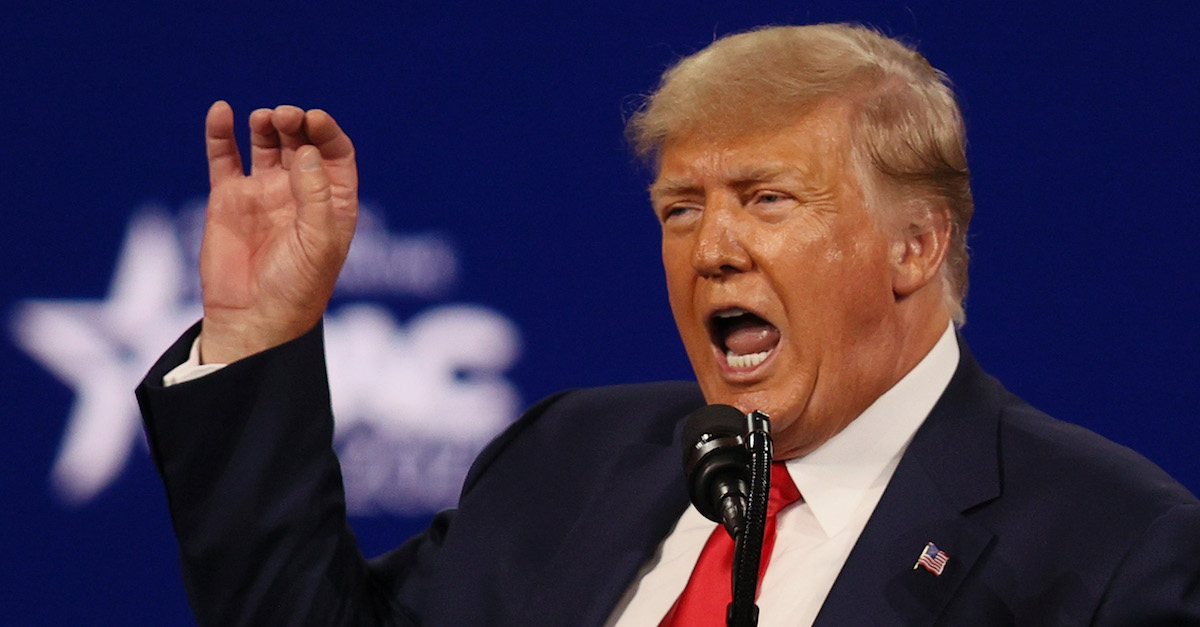
Former President Donald Trump asked a federal court late Monday to block the release of White House documents related to the Jan. 6 attack on the U.S. Capitol.
The documents in question are being sought by congressional investigators from the Select Committee to Investigate the January 6th Attack on the U.S. Capitol.
In the lawsuit, Trump’s attorney accuses the committee of deciding to “harass” the former president and his aides while characterizing the document requests as “illegal, unfounded, and overbroad.”
Committee Chair Rep. Bennie Thompson (D-Miss.) filed a series of requests for relevant documents in late August with David Ferriero, who runs the National Archives. Thompson, the committee, Ferriero and the National Archives are all named defendants in the lawsuit.
“The Committee’s requests are unprecedented in their breadth and scope and are untethered from any legitimate legislative purpose,” Trump’s lawsuit argues. “The Committee’s boundless requests included over fifty individual requests for documents and information, and mentioned more than thirty individuals, including those working inside and outside government during the unreasonably overbroad time period covered by the request. Aside from being overly broad and seeking records protected by numerous legal privileges, these requests are also unduly burdensome because of the substantial time required to conduct an adequate review of the voluminous records.”
Earlier this month, White House Counsel Dana Remus advised the National Archives that they could comply with the committee’s request in a letter noting that President Joe Biden “has determined than an assertion of executive privilege is not in the best interests of the United States” regarding any of the documents at issue.
Trump’s filing lashes out at the current administration and characterizes Biden’s decision to forego executive privilege as “a political ploy to accommodate his partisan allies.”
“The Committee’s request amounts to nothing less than a vexatious, illegal fishing expedition openly endorsed by Biden and designed to unconstitutionally investigate President Trump and his administration,” the lawsuit argues. “Our laws do not permit such an impulsive, egregious action against a former President and his close advisors.”
In the filing, Trump’s attorney Jesse Binnall argues that the committee’s request “lacks a valid legislative purpose and thus violates the Constitution and separation of powers.” Binnall’s legal analysis relies on the Supreme Court’s Mazars decision, which established that lower courts must take into account separation of powers concerns implicated by congressional subpoenas when information related to the president is implicated.
Binnall, notably, was one of Trump’s ever-present attorneys during the avalanche of largely-failed litigation aimed at overturning the results of the 2020 election.
Reprising arguments he made in response to previous congressional inquiries, Trump claims that the Jan. 6th committee lacks any legislative purpose and is simply trying to act like a law enforcement agency, which other high court precedent also precludes.
“The Committee has utterly failed to come forward with such evidence here to satisfy the standard; there is no specific legislative need for the privileged documents and materials requested, much less a ‘demonstrably critical’ one,” the lawsuit argues, citing language from another precedential decision.
Trump, of course, is no longer president but is arguing for an extension of executive privilege that outlasts the office itself.
“These burdens are not sufficiently diminished by the fact that the President is no longer in office,” the filing states. “The Supreme Court has ‘reject[ed] the argument that only an incumbent President may assert’ separation-of-powers claims.”
Trump also asserts numerous other privilege claims over the documents sought by the Jan. 6th committee, including presidential communications, deliberative process and other privileges. He has not made a “conclusive” assertion of executive privilege over all of the requested records, but he has made a “protective” one, his lawyer said.
The lawsuit, filed in D.C. District Court, seeks preliminary and permanent injunctions barring the committee from “taking any actions to enforce the requests, from imposing sanctions for noncompliance with the requests, and from inspecting, using, maintaining, or disclosing any information obtained as a result of the requests.” He also seeks similar court orders to stop the National Archives from providing any of the requested information.
The Jan. 6 Committee did not immediately respond to Law&Crime’s request for comment.
Read the full filing below:
[image via Joe Raedle/Getty Images]